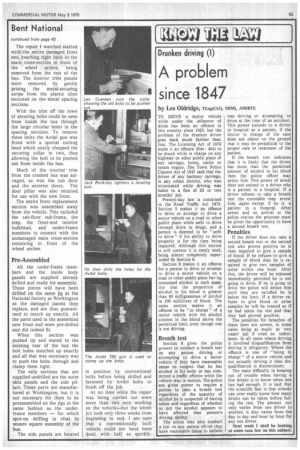Drunken driving (1)
Page 45

If you've noticed an error in this article please click here to report it so we can fix it.
A problem since 1847 by Les Oldridge, TEng(CEI), MIMI, AMIRTE TO DRIVE a motor vehicle while under the influence of drink has been an offence in this country since 1925, but the problem of the drunken driver goes back much farther than that. The Licensing Act of 1872 made it an offence (fine : 40s) to be drunk while in charge on any highway or other public place of any carriage, horse, cattle or steam engine. The Town Police Clauses Act of 1847 said that the driver of any hackney carriage, in any urban district, who was intoxicated while driving was liable to a fine of £5 or two months' jail.
Present-day law is contained in the Road Traffic Act 1972. Section 5 makes it an offence to drive or attempt to drive a motor vehicle on a road or other public place while unfit to drive through drink or drugs, and a person is deemed to be "unfit to drive " if his ability to drive properly is for the time being impaired. Although this section is still current it is rarely used, being almost completely superceded by Section 6.
Section 6 makes it an offence for a person to drive or attempt to drive a motor vehicle on a road or other public place hav'ng consumed alcohol in such quantity that the proportion of alcohol in his blood is greater than 80 milligrammes of alcohol in 100 millilitres of blood. The same section makes it an offence to be " in charge " of a motor vehicle with the alcohol content in the blood above the permitted limit, even though one is not driving.
Breath test
Section 8 gives the police powers to conduct a breath test on any person driving or attempting to drive a motor vehicle if they have reasonable cause to suspect that he has alcohol in his body or has committed a traffic offence while the vehicle was in motion. The police are given power to require a person to take a breath test regardless of the quantity of alcohol he is suspected of having taken and regardless of whether or not the alcohol appears to have affected that person's driving ability.
The police may also conduct a test on any person whom they have reasonable cause to believe was driving or attempting to drive at the time of an accident. This power extends to a driver in hospital as a patient, if the doctor in charge of the case does not object on the ground that it may be prejudicial to the proper care or treatment of the patient.
If the breath test indicates that it is likely that the driver has more than the permitted amount of alcohol in his blood then the police officer may arrest him. This power of arrest does not extend to a driver who is a patient in a hospital. If a driver refuses to take a breath test the constable may arrest h:m, again except if he is a patient in a hospital. After arrest and on arrival at the police station the prisoner must be given the opportunity to have a second breath test.
Penalties
If the driver does not take a second breath test or the second test also proves positive he is then required to give a sample of blood. If he refuses to give a sample of blood then he is required to give two samples of urine within one hour. After this, the driver will be released immediately provided he is not going to drive. If he is going to drive the police will detain him until they are satisfied he is below the limit. If a driver refuses to give blood or urine samples he will be treated as if he had taken the test and that they had proved positive.
The penalties for breaches of these laws are severe, in some cases being as much as two years' jail if tried on indictment. In all cases where driving is involved disqualification from driving is obligatory. Where the offence is one of "being in charge " of a motor vehicle and not actually driving it then disqualification is discretionary.
The main difficulty in keeping out of trouble when having a few drinks is to know when one has had enough. It is said that the scientific fact is that nobody can ever really know how many drinks can be taken before failing the test. The amount not only varies from one driver to another, it also varies from the day to day and hour by hour for any one driver.
Next week I shall be looking at some case law on this subject.




























































































































































